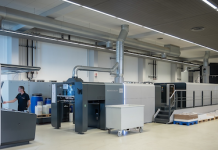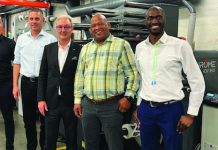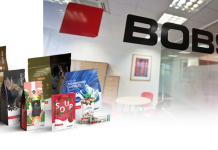Ricoh has announced that its Pro VC70000 continuous feed inkjet press will soon make its worldwide public debut. Ricoh will present the patent-pending dryer technology of the Pro VC70000, designed for greater ink coverage and to eliminate cockling.
The Pro VC70000 will make its worldwide public debut at at Hunkeler Innovationdays 2019, Messe Lucerne, February 25- 28. It prints at 12,000 sheets per hour and assures fast, consistent and high quality print using new Ricoh-developed inks that support traditional offset coated substrates. The latter capability will be highlighted with a wealth of offset coated paper applications including a 225mm square sewn and bound photobook printed on 150gsm media as well as direct mailers and leaflets.
Showcasing flexible and responsive mono continuous feed inkjet production will be the compact Ricoh Pro V20000. It enables PSPs to profitably produce applications ranging from pharmaceutical leaflets to transactional print such as bills, statements and policy documents as well as books and direct mail.
Colour sheet fed productivity and reduced operational costs will be presented by the Ricoh Pro C9200 digital press. Built on the Ricoh Pro C9100 technology platform, it offers increased image quality with outstanding registration to empower business growth. To support efficient and streamlined continuous feed and sheet fed production, Ricoh will present new additions to its software portfolio and highlight the capabilities of Ricoh’s TotalFlow BatchBuilder and Ricoh’s ProcessDirector.
Eef De Ridder, vice president of commercial printing, commercial and industrial printing group, Ricoh Europe, said, ‘Our continuous feed production platform is growing fast and we are delighted to be able to give visitors to Hunkeler Innovationdays 2019 a first look at all the exciting technologies featured in our Pro VC70000 system. The combination of Ricoh proprietary technologies, including the unique dryer and our new inks, supports offset substrates and opens up a whole new world of production possibilities.’





















